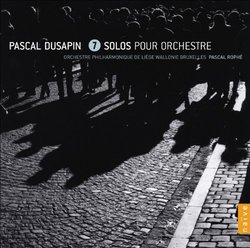| All Artists: Pascal Dusapin, Lwb, Rophe Title: 7 Solos for Orchestra: Cycle of the 7 Forms Members Wishing: 0 Total Copies: 0 Label: Naive Original Release Date: 1/1/2010 Re-Release Date: 5/25/2010 Genre: Classical Style: Symphonies Number of Discs: 2 SwapaCD Credits: 2 UPC: 822186821800 |
Search - Pascal Dusapin, Lwb, Rophe :: 7 Solos for Orchestra: Cycle of the 7 Forms
 | Pascal Dusapin, Lwb, Rophe 7 Solos for Orchestra: Cycle of the 7 Forms Genre: Classical
|
Larger Image |
CD Details |
CD ReviewsStunning orchestral cycle, a Xenakis-Messiaen hybrid R. Hutchinson | a world ruled by fossil fuels and fossil minds | 06/15/2010 (5 out of 5 stars) "Pascal Dusapin is a leading French composer, almost exactly my age, whose main form is the opera. But he has written many other works, and the release of this 2-disc Naive set of 7 SOLOS FOR ORCHESTRA: THE CYCLE OF THE SEVEN FORMS is one of the major musical events of the year. The 7 Solos are: Go (1992 premiere -- 8'04), Extenso (1994 premiere -- 12'31), Apex (1996 premiere -- 15'55), Clam (1998 premiere -- 11'24), Exeo (2003 premiere -- 13'29), Reverso (2007 premiere -- 19'09), and Uncut (2009 premiere -- 9'36). Dusapin began writing the works here in 1991, and finished in 2008. While the seven constituent parts were commissioned by six different orchestras, the superb performances here are all by the Orchestre Philharmonique de Liege Wallonie Bruxelles, led by Pascal Rophe. As Dusapin explains in the liner notes,
"In the early 1990s, I wanted to get away from the running times of between ten and twenty minutes that are invariably associated with commissions for orchestra. Since no one was offering me commissions to produce longer symphonic forms, I decided to bide my time. I dreamt of an extended, complex form comprising seven autonomous episodes regenerating themselves from within, fertilising other possibilities, and proliferating on the interstices left open by the preceding fluxes." The composer's own liner notes offer fascinating insights into the formal construction of the work(s), especially the links among the different parts. He says, for instance, that "Go" refers both to irrevocable resolve (let's go!), and to the Chinese game of strategy, "the object of which is to build up territories by using the simplest of materials. Which is the concept of the whole cycle." He refers to the transmutation of block chords in "Extenso" as "incessant reptilian movements," which I can scarcely improve on! But let me turn to the poetic and try to evoke the sound of the piece. The most obvious point of comparison for Dusapin is Xenakis. Dusapin studied with Xenakis from 1974 to 1978, and his work is a maverick outgrowth of that background as Xenakis's work was a maverick outgrowth of his teacher Messiaen, following a unique path independent of the Darmstadt School composers of his generation. Dusapin's 7 SOLOS shares with Xenakis's orchestral writing the use of glissandos, and has a similar organic feel to it, dynamically developing without reference to standard guideposts of sonata form or standard movements. However, while Xenakis's music typically impresses the listener as awesomely inhuman, developing at the organic/inorganic interface where life springs from the very rocks, or expressing the majestic unfurling of clouds or waves, Dusapin's writing is evocative of myth and ritual, of a sacred mystery. Brass fanfares alert us to our entry into non-linear time, while long, low tones and percussion give us the sensation we are in a deep, dark space where we seek the divine. Messiaen reberverates in this space! Dusapin, to my ear, has achieved his own unique synthesis of Messiaen and Xenakis in this cycle. Xenakis epitomized heroic modernism, striving to create something utterly new. Dusapin and I are of the more recent period when the old metanarratives were all cracking apart giving birth to strange hybrids, a world of postmodern play in which many worlds and stories jumble and none have primacy. The 7 SOLOS journey through this world evoking wonder and mystery, open to the older realm of the Sacred as well as the newer sense of flux and impermanency. Very Buddhist, it seems to me, though I have no knowledge that Dusapin is explicitly reflecting Dharma teachings. This is one of three new Dusapin releases this year, along with Naive's expanded reissue of the Concertos (see my review), and Aeon's release of the String Quartets & Trio, performed by the Arditti Quartet. I was quite happy to see this acknowledged by the New York Times in a May 11th, 2010 article by Steve Smith called "Riding Herd on the Wild Orchestra." Two of the early Solos, "Extenso" and "Apex" were released on an earlier Naive disc in 1998, reissued in 2000. Those recordings were of the Orchestre National de Lyon, which commissioned both works, led by Emmanuel Krivine. I heard those earlier recordings, and it is fantastic to now hear them in the full context that Dusapin has dreamt of all these years! I consider Pascal Dusapin to be one of the finest composers of our time, and I look forward to the release on disc of his latest opera, PASSION, which had its premiere in 2008. (verified purchase from ArkivMusic) " |

 Track Listings (4) - Disc #1
Track Listings (4) - Disc #1